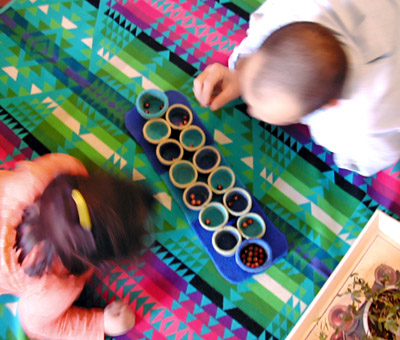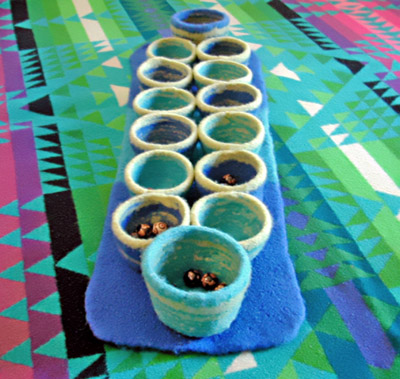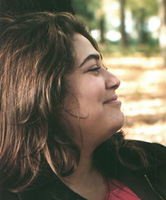
  by
Wendy Wonnacott by
Wendy Wonnacott

Take one part need for fun game
that I could play with both hubby and kiddo without
boredom setting in and two parts need to torture wool
into submission and you get a felted game, of course.
Mancala is believed to be one of mankind's oldest
games coming from either Africa or the Middle East
1000 to 3000 years ago (that should narrow it down).
Empires have been won, and lost over such a simple
game (okay I'm making that up but hey, it could happen).
Players take turns moving their
beads around the board, whoever has the most beads
in their big bowls when all of the little bowls have
been emptied wins! There are countless variations
to the rules, as well as over 350 different names
for the game, I've included the rules that I most
frequently use.
I used Cascade 220 for the very
first time on this project and I'm hooked! So many
colors and felts like a dream. A great little game
to use up all those feltable odds and ends, I used
three different colors, the turquoise and blue heather
as main colors and the gold as the contrasting color
on the cups in random stripes. An attached i-cord
brim was added for extra stability. Use your or the
recipients favorite colors, don't like stripes? Do
solids!
|
|  model: Fortunato
Caragliano and Melissa Caragliano
model: Fortunato
Caragliano and Melissa Caragliano  photos: Wendy
Wonnacott
photos: Wendy
Wonnacott |
|
| One |
| |
Width: 6.3 inches (16 centimeters)
Length: 21.26 inches (54 centimeters) |
| |
| |
|  [MC1] Cascade Yarns Cascade 220 [100% Peruvian Highland
Wool; 220yd/201m per 100g skein]; color: #9457 Dark
Blue Heather; 1 skein
[MC1] Cascade Yarns Cascade 220 [100% Peruvian Highland
Wool; 220yd/201m per 100g skein]; color: #9457 Dark
Blue Heather; 1 skein
 [MC2] Cascade Yarns Cascade 220; color: #9455 Turquoise
Heather; 1 skein
[MC2] Cascade Yarns Cascade 220; color: #9455 Turquoise
Heather; 1 skein
 [CC] Cascade Yarns Cascade 220; color: #7827 Gold;
1 skein
[CC] Cascade Yarns Cascade 220; color: #7827 Gold;
1 skein
 1 set US #8/5mm double-point needles
1 set US #8/5mm double-point needles
 1 set US #8/5mm straight needles
1 set US #8/5mm straight needles
 Tapestry needle for weaving in ends
Tapestry needle for weaving in ends
 Sharp needle for attaching cups to base
Sharp needle for attaching cups to base
 Thread
Thread
 36 half-inch (13mm) or larger in diameter beads (or
the like) for use as game markers.
36 half-inch (13mm) or larger in diameter beads (or
the like) for use as game markers.
|
[Knitty's list of standard
abbreviations can be found here]
|
| 16 sts/22 rows =
4 inches in stockinette stitch (before felting) |
| |
NOTE: For Small and Large
Bowls, work stripes as desired.
Small Bowls
(Make 12)
Using dpns and MC1 or MC2 (as desired), CO 36 sts.
Place 12 sts on each of 3 needles (if you have a
set of 4 dpns), or 9 sts on each of 4 needles (if
you have a set of 5 dpns). Place marker and join
to begin working in the round, being careful not
to twist.
 Rnds
1-4: K all sts. Rnds
1-4: K all sts.
Rnd 5: [K5, k2tog, k5] around. 33 sts rem.
Rnds 6-7: K all sts.
Rnd 8: [K2tog, k9] around. 30 sts rem.
Rnds 9-10: K all sts.
Rnd 11: [K4, k2tog, k4] around. 27 sts
rem.
Rnd 12: K all sts.
Rnd 13: [K7, k2tog] around. 24 sts rem.
Rnd 14: K all sts.
Rnd 15: [K3, k2tog, k3] around. 21 sts
rem.
Rnd 16: K all sts.
Rnd 17: [K5, k2tog] around. 18 sts rem.
Rnd 18: K all sts.
Rnd 19: [K2, k2tog, k2] around. 15 sts
rem.
Rnd 20: [K2tog, k3] around. 12 sts rem.
Rnd 21: [K1, k2tog, k1] around. 9 sts rem.
Remove marker and k2 tog around until 3 sts rem.
Break yarn, draw through rem sts and pull tight.
With CC, work applied
4-st I-cord around top edge of cup.
Large Bowls
(Make 2)
Using dpns and CC, CO 48 sts.
Place 16 sts on each of 3 needles (if you have a
set of 4 dpns), or 12 sts on each of 4 needles (if
you have a set of 5 dpns). Place marker and join
to begin working in the round, being careful not
to twist.
Rnds 1-6: K all sts.
Rnd 7: [K7, k2tog, k7] around. 45 sts.
Rnds 8-9: K all sts.
Rnd 10: [K2tog, k13] around. 42 sts.
Rnds 11-12: K all sts.
Rnd 13: [K6, k2tog, k6] around. 39 sts.
Rnd 14: K all sts.
Rnd 15: [K2 tog, k11] around. 36 sts.
Rnd 16: K all sts.
Rnd 17: [k5, k2tog, k5] around. 33 sts.
Rnd 18: K all sts.
Rnd 19: [K2tog, k9] around. 30 sts.
Rnd 20: [K4, k2tog, k4] around. 27 sts.
Rnd 21: [K2tog, k7] around. 24 sts.
Rnd 22: [K3, k2tog, k3] around. 21 sts.
Rnd 23: [K2tog, k5] around. 18 sts.
Rnd 24: [K2, k2tog, k2] around. 15 sts.
Rnd 25: [K2tog, k3] around. 12 sts.
Rnd 26: [K1, k2tog, k1] around. 9 sts.
Rnd 27: [K2tog, k1] around. 6 sts.
Rnd 28: K2tog around. 3 sts rem.
Break yarn, draw through rem sts and pull tight.
With MC1 or MC2, work applied 4-st I-cord around
top edge of cup.
Base
(Make 1)
Using straight needles and MC1, CO 35 sts.
Row 1 [RS]: K1, m1, k to last st, m1, k1.
Row 2 [WS]: P all sts.
Work these 2 rows 4 times more. 45 sts
Cont in stockinette st until work measures10.5 inches
(27 cm).
Switch to MC2, cont in stockinette st until work
measures 20.75 inches (53 cm).
Switch back to MC1, cont in stockinette st until
work measures 30 inches (77 cm), ending with a RS
row.
Row 1 [WS]: P all sts.
Row 2 [RS]: K 1, k2tog, k to last 3 sts,
ssk, k1.
Work these 2 rows 4 times more. 35 sts.
BO all sts.
|
|
Weave in all ends.
Felt in washing machine using low water/economy setting
on hot water wash with a couple pairs of jeans or
other heavy garment to provide agitation. Add a small
amount of detergent or dishsoap to the pieces. Check
every 10 - 15 minutes. Once stitch definition is no
longer visible, pull out, rinse with cold water then
block. For blocking I found hard plastic drinking
cups worked like a charm. Adding in some nuts/bolts/nails
for weight will make for a nice and tidy bottom to
the bowls. Prod the base into the correct dimensions
and pin down. Let pieces dry completely. Shave pieces
if desired.
With either tapestry needle and
left over yarn, or sewing needle and thread, tack
down bowls to base as shown in the schematic. Then
join together brims of bowls where they meet with
a couple stitches, tying off between the bowls. Trim
all ends.
Note on gauge and substituting yarn:
If you are substituting another yarn for Cascade 220,
I recommend that you knit a swatch of the yarn you
will be using, then felt it, making note of pre- and
post- felting measurements. Knit up and felt the bowls
first. Arrange the bowls according to schematic and
measure how large a piece you will need to make for
the base. Using your swatch's pre- and post- felting
dimensions, you can determine how many stitches and
how long of a piece you will need to knit in order
to have finished measurements you need for your alternate
yarn. And don't fear -- if your calculations go awry,
your base can be trimmed to the right size after felting!
Now you're ready to play. See how
below.
Basic Rules
of MancalaMia! (adapted from the computer game
Mancala v2.0)
At the start of the game each of
the little bowls contains 3 beads.
To play, each person takes turns moving their beads
counter-clockwise around the board.
First the player chooses which little bowl to move
the beads from, then places them one at a time into
the successive bowls.
Beads placed into the player's big bowl are points
for that player.
Beads are not placed in the opponent's big bowl.
If the last bead is placed in the player's own big
bowl the player gets another turn.
If the last bead is placed in an empty little bowl
on their own side of the board, then they capture
all the beads in the opposite (the opponent's) little
bowl.
The captured beads and the capturing bead are placed
into the player's big bowl.
The game is finished when all of the little bowls
on one side of the board are empty.
The player with beads remaining gets to put them in
their big bowl.
The player with the most beads in their big bowl wins.
|
  Wendy
lives in Sicily at the foot of Europe's largest active Wendy
lives in Sicily at the foot of Europe's largest active
volcano.
Her days are spent torturing her husband, daughter
and the natives with her lousy Italian as she schemes
up her next sacrifice to the Boiling Cauldron of Death.
She documents it all here. |
| Pattern & images
© 2004 Wendy Wonnacott. Contact Wendy |
|

